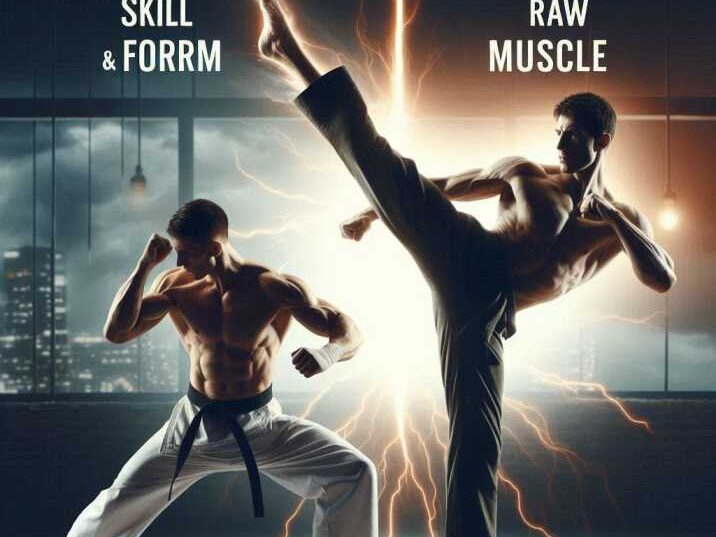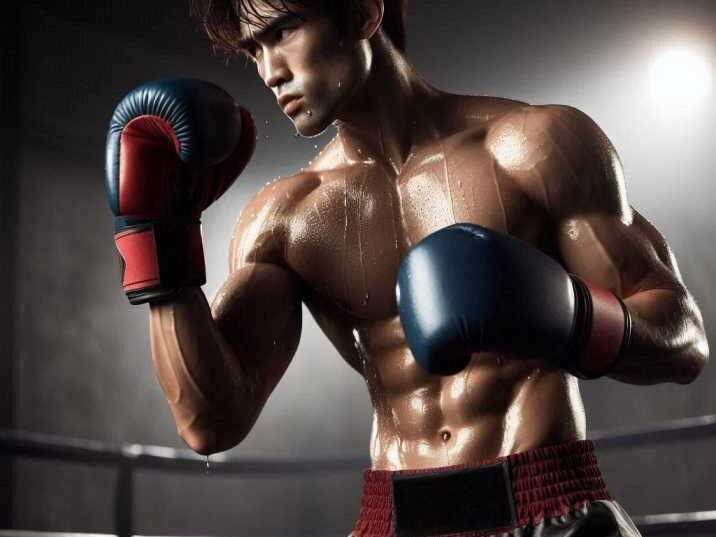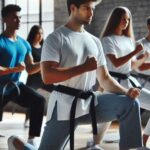Martial arts is a practice that blends physical strength, technique, discipline, and mental focus. Many people think you need to be muscular to excel in martial arts, but is that true? While strength helps, martial arts relies on much more than just muscle power. In this article, we’ll explore whether is essential to be muscular for martial arts and why other factors like agility, technique, and mindset are just as crucial. Let’s break down the role of muscle in martial arts training, what makes a successful martial artist, and how focusing on strength alone can be misleading.

Introduction
Table of Contents
When people think of martial arts, they often picture fighters with big, strong muscles. But in reality, you don’t need to be a bodybuilder to succeed in martial arts training. Being muscular can help in some aspects of martial arts, like delivering powerful strikes, but it’s not the most important thing. Martial arts training is more about technique, timing, flexibility, and endurance than just raw power. The key to mastering martial arts is a combination of different physical and mental skills. So, do you need to be muscular for martial arts? Let’s dive deeper.
What Matters in Martial Arts?
In martial arts, the right technique is more important than muscle size. Many martial arts techniques focus on using your opponent’s strength against them. For instance, in Brazilian Jiu-Jitsu or Judo, smaller fighters can often defeat larger, stronger opponents by using leverage and body positioning. Here are some factors that are more important than muscles:
1. Technique Over Strength
- Martial arts teaches fighters to use proper techniques to control their opponent, not just brute force. With the right moves, even someone who isn’t very muscular can take down a much larger opponent.
2. Speed and Agility
- Being quick and agile is crucial in martial arts training. A fast reaction time and the ability to move swiftly can help you dodge attacks and land strikes. Sometimes, speed can outweigh the benefits of having bigger muscles.
3. Endurance and Stamina
- Martial arts requires endurance to keep fighting, especially in long matches. Strong muscles won’t help if you can’t keep up your energy. Building stamina and cardiovascular strength is more important than having large muscles.
4. Flexibility
- Flexibility is a huge part of many martial arts styles. In Taekwondo, for example, high kicks and complex moves require flexibility, not necessarily muscle mass. The ability to stretch and move freely can give fighters an edge over opponents who may be more muscular but less flexible.
5. Mental Focus
- Mental discipline is one of the most important aspects of martial arts. Martial arts training requires focus, patience, and a calm mind. This mental strength can often determine success more than physical size. Concentration helps you anticipate your opponent’s moves and stay calm under pressure.
Does Being Muscular Help in Martial Arts?
While muscles aren’t everything, being muscular can provide certain advantages in martial arts training. Here are some ways that muscle strength can help:
1. Powerful Strikes
Muscles, especially in the upper body, help fighters generate more force in their punches and kicks. In striking martial arts like Muay Thai and Karate, having stronger arms and legs can deliver harder, more powerful blows, giving an edge during sparring or competition.
2. Grappling and Wrestling
- In grappling or wrestling styles like Brazilian Jiu-Jitsu or Judo, muscle strength helps when it comes to pinning or controlling an opponent on the ground. But even here, a technique usually wins over pure strength.
3. Better Balance
- Strong core muscles improve your balance, which is important in almost every martial art. Core strength helps with stability, which means you’re less likely to be knocked off your feet during a fight.

Why Being Too Muscular Can Be a Problem
While having muscles can help in martial arts, being too muscular can sometimes work against you. Here’s why:
1. Reduced Flexibility
- If you focus too much on building muscle, you may lose some of your flexibility. Large muscles can make it harder to perform high kicks or other complex moves that require a full range of motion.
2. Slower Movements
- Bigger muscles can sometimes slow you down. Martial arts often require fast reactions, and if your muscles are too bulky, you may not be able to move as quickly as needed.
3. Quick Fatigue
- Larger muscles need more oxygen and energy. This means that if you’re too muscular, you might tire out faster during a match. Endurance and stamina are essential, so building too much muscle could hurt your performance.
The Ideal Body for Martial Arts
So, what is the ideal body type for martial arts? The answer is that there isn’t just one type of body that works best. Instead of focusing on getting big muscles, martial artists should aim for a balanced body. This means combining strength, endurance, flexibility, and mental focus to create the perfect mix of skills for your martial arts.
Some successful martial artists are lean and flexible, while others are strong and muscular. The key is to train in a way that complements your natural strengths and improves your weaknesses.
Training Tips for Martial Arts
If you’re interested in martial arts and wondering how to train, here are a few tips to help you:
1. Focus on Technique
Mastering the correct technique is crucial in martial arts. It’s about precision and form, not raw power. Good technique helps you use balance and timing to outmaneuver opponents, even if they’re stronger.
2. Build Strength, but Don’t Overdo It
Strength training helps enhance strikes and grappling, but it’s important to balance it with flexibility and speed exercises to avoid becoming stiff or slow.
3. Improve Your Flexibility
Flexibility is key to performing high kicks and quick movements. Include stretching or yoga in your routine to improve your range of motion and prevent injuries.
4. Train Your Mind
Martial arts are mental as much as physical. Practice meditation or breathing exercises to improve focus, clarity, and calmness under pressure.
5. Stay Consistent
Consistency is the secret to improvement. Regular practice, whether focusing on technique, strength, or flexibility, will help you progress steadily over time.
Table of Information: Key Factors for Success in Martial Arts
| Key Factor | Why It’s Important | Examples in Martial Arts |
|---|---|---|
| Technique | Allows smaller fighters to defeat larger ones | Brazilian Jiu-Jitsu, Judo |
| Speed and Agility | Helps dodge attacks and land quick strikes | Taekwondo, Boxing |
| Endurance and Stamina | Ensures you can fight for longer periods | All martial arts |
| Flexibility | Needed for high kicks and complex movements | Taekwondo, Capoeira |
| Mental Focus | Helps with strategy and staying calm under pressure | All martial arts |
Conclusion
In conclusion, you do not need to be muscular to excel in martial arts. While strength can help with powerful strikes and grappling, other factors like technique, flexibility, endurance, and mental focus are more important for success. Whether you’re strong and muscular or lean and flexible, martial arts can be adapted to suit your strengths. By training consistently and focusing on a balanced approach, anyone can become a skilled martial artist, regardless of muscle size.
FAQs
1. Do you need to lift weights for martial arts?
Lifting weights can help build strength, but it’s not required. Martial artists often focus more on bodyweight exercises and technique.
2. Can a small person succeed in martial arts?
Yes, martial arts techniques like those in Brazilian Jiu-Jitsu allow smaller people to defeat larger opponents by using leverage and skill.
3. What is more important in martial arts, strength or speed?
Both are important, but speed and technique are often more valuable than strength alone.
4. Will martial arts make you muscular?
Martial arts will make you stronger and more toned, but it won’t necessarily build large muscles unless combined with specific strength training.
5. Can being too muscular hurt your martial arts performance?
Yes, being too muscular can reduce flexibility and make you slower, which could hurt your performance in martial arts.


